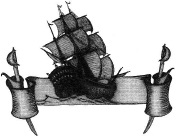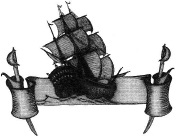Peter and the Shadow Thieves (14 page)
Read Peter and the Shadow Thieves Online
Authors: Dave Barry,Ridley Pearson
Tags: #Juvenile Fiction, #General, #Action & Adventure
THE SCUTTLEBUTT
P
ETER HAD NEVER FELT hungrier, or thirstier. He’d been awakened from his restless sleep by the ache of his empty bely. His lips were dry and cracked; his throat was parched.
The only good thing about the situation, as far as Peter could tel , was that since the incident with the young sailor that morning, no crewman had climbed near his hiding place.
Peter had some experience at sea; he knew that as long as the wind held and the ship maintained its present course, the sailors would have no reason to do anything to the sail where he’d taken refuge. With any luck, he could be undisturbed here for days.
But he had to find food and water. Especial y water. He had to find some
soon.
Unfortunately, he dared not venture out of his hiding place until darkness fel .
The afternoon hours passed slowly and uncomfortably; Peter felt increasingly cramped, hot, and sweaty in his tight canvas confinement. Final y,
finally,
the sky began to darken.
At last the sun went down, and the welcome coolness of night enveloped the ship.
Peter wriggled his way toward the top of the sail. Tinker Bel poked her tiny head over the edge and looked down.
“What do you see, Tink?” Peter whispered.
Soft bel s.
Some men working. Some talking. Nobody looking this way.
“Is there a place where I can land down there, where they won’t see me?” whispered Peter.
A pause as Tink scanned the deck. Then: Yes. At
the back. I’ll show you.
Tink fluttered out of the sail and hovered. Peter, moving stiffly, poked his head up from the canvas and looked around. The moon was not yet up; the rigging was dark. Peter realized that he probably would not be spotted even if somebody on deck did happen to look up. He crawled out on the yard and looked to where Tink was pointing: a darkened area of the deck toward the stern, on the port side, alongside the raised poop deck where the helmsman stood at the wheel. Peter saw that, if he crouched, he could not be seen from the helm.
But he would have to be alert for anybody coming back along the port rail.
“Okay,” he whispered to Tink. “Let’s go.”
In an instant, Tink, who could fly faster than Peter could see, darted down to the deck. Peter swooped right behind her, enjoying the
swoosh
of the cool air on his face. He crouched on the deck next to Tink, listening for a shout that would mean somebody had seen him.
Nothing.
“Al right,” he said. “Now I need to find water.”
Soft bel s from Tink.
I know where the water is.
“You do?” whispered Peter. “Where?”
A barrel, in the middle of the ship. The sailors get water from it with a big spoon.
“The scuttlebutt!” whispered Peter. He remembered the term from his time aboard the il -fated scow
Never Land.
The crew often gathered by the scuttlebutt—a water barrel with a wooden ladle—to slake their thirst and trade gossip.
“Can I get to it?” whispered Peter. “Wil I be seen?”
Tink flitted forward, keeping close to the deck, then flitted back with the bad news.
There are two men nearby.
“How near?”
This near.
In less than a second, Tink flew fifteen feet aft-ward along the rail, then back. If the men were only that far from the scuttlebutt, they would surely see Peter.
“Oh,” said Peter, despondent. His throat felt more parched than ever. Since Tink had mentioned the scuttlebutt, he’d almost tasted the water.
Wait here,
said Tink. She flitted forward again, returning about a minute later, looking frustrated.
“What happened?” said Peter.
The spoon,
she said.
I can’t lift it. It’s tied to the barrel, anyway.
Despite his discomfort, Peter had to smile, touched by Tink’s effort to carry the big ladle back to him.
“It’s al right, Tink,” he said. “Thanks for trying.”
Tink shook her head.
I’ll find something smaller,
she said.
Peter looked around, but saw nothing that could be used to carry water. Smal objects were not left lying about on a ship’s deck, as they inevitably were blown overboard.
“Tink,” Peter whispered, “I don’t think—”
But Tink was gone again…this time over the side of the ship. Peter wondered what she could possibly be up to, but he had no choice other than to wait, which he did for several minutes, before Tink reappeared, dripping wet, proudly holding…a shel .
“Where’d you get that?” whispered Peter, not believing that Tink—even Tink—could have swum down to the seafloor.
From the side of the ship,
she said.
Peter examined the shel . Sure enough, it was a barnacle shel . But
how
…
“How did you get it free from the ship?” he said. Barnacles were notoriously hard to remove from a hul ; they clung with astonishing strength, as any sailor would agree after spending a few unhappy hours trying to scrape them off.
I talked to it,
said Tink.
“You
talked
to it?” Peter whispered. He was about to express skepticism, but he realized that if anybody could talk a barnacle into letting go of a ship, it was Tink.
Wait here,
she said. Clasping the shel , she zipped forward.
A few moments later she was coming back, flying cautiously, holding the shel in front of her, frowning in concentration as she struggled to avoid spil ing a drop. She reached Peter and handed him the shel . He brought it eagerly to his lips. It was only an ounce, maybe less, and it smel ed of barnacle, but it was the sweetest thing Peter had ever tasted. He swished it around in his parched mouth and swal owed, then licked the shel .
“Thanks, Tink,” he whispered.
I’ll get more,
she said, taking the shel .
“What about the sailors?” Peter said.
They’re looking the other way.
“Be careful,” said Peter, but she was already gone.
Tink made a dozen more trips, two dozen, slaking Peter’s thirst an ounce at a time. Each time, her route to the scuttlebutt took her over a certain spot on the deck. Each time she passed over that spot, she felt an odd sensation. At first she disregarded it, but it became more pronounced with each trip, until she found herself swerving around the spot. But stil she sensed it, a distinctly unpleasant feeling.
A chil .
She didn’t mention it to Peter; she wasn’t sure what it was, and she didn’t want to appear afraid. So she avoided the spot as best she could, bringing Peter his water until final y he insisted that she stop before somebody saw her.
“That was wonderful, Tink,” he whispered. “Thanks again.”
You’re welcome.

“Now let’s find some food,” said Peter. “I’m starving.”
Directly beneath the spot on the deck that had troubled Tink was the smal , tomb-dark inner cabin where Lord Ombra spent most of his time on the ship. Ombra was there now. Each time Tink had passed overhead, he too had sensed something.
He rose, glided to the door, and opened it. The gloom in the passageway told him night had ful y fal en. It would be dark on the deck.
Ombra would go hunting.

TUBBY TED’S DISCOVERY
T
UBBY TED HAD EATEN three bananas for breakfast, after first eating two coconuts, a mango, and something that looked and tasted a lot like bread, which the Molusks made out of seeds and pounded grass. They were nice enough to drop a couple loaves by each day, to keep the boys from starving to death.
Tubby Ted was in no danger of that. He was more in danger of bursting. But he decided that what he needed was another three, or perhaps another five, bananas. The boys had eaten al the ripe ones from the trees near their hut, so Ted wandered off into the jungle a ways, until he spotted a tree with a nice-looking bunch. He was searching for a stick to knock them down with when…
WHOOMP!
Suddenly, Ted was not standing: he was sitting on the ground. And
one of his legs was missing.
The left one, to be precise. This was very upsetting for a moment, until Ted realized that he could stil
feel
the leg, but it had gone into the ground somehow.
Quicksand!
he thought. The Mol usks had warned the boys that there was quicksand on the island; that it would trap a person and slowly suck him under. The boys had asked why, if it acted slowly, was it cal ed
quick
sand. The Mol usks had replied that, as far as they were concerned,
most
English names for things were sil y. The word that they used for quicksand was a deep grunt that translated roughly to “uh-oh.”
But this was not quicksand: when Tubby Ted wiggled his left foot, it moved freely, and it wasn’t wet. He tried to pul it free, to stand up, but could not. So he started to dig. But as he dug, to his surprise, most of the dirt didn’t come up in his hand: instead, it disappeared, fal ing away down into the hole with his leg.
In a few moments, Ted had the hole large enough to pul his leg free. The hole was big enough for Ted to stick his head down and take a look inside. Thus, when James came along, searching for his missing friend, he saw only the backside of Tubby Ted sticking up, like a plump ostrich in shorts.
“What are you doing?” James cal ed out.
Tubby Ted pul ed his head out, clumps of dirt sticking to his hair, his sweaty face smeared with dirt and mud. A bright orange-and-green three-inch centipede dangled from his left ear, like an earring.
“Oh, hul o, James,” said Ted. “I was looking for bananas.”
“Under the ground?” said James, reaching out and batting away the centipede.
“No, I was going to get them from up there”—he pointed up at the bananas—“and I fel into this hole here.” He pointed down. “So then I looked into it and I found a much bigger hole. A
very
big hole. It has lava wal s and a dirt floor.”
“Real y?” said James. He stuck his head into the hole, looked around, then pul ed his head out, his eyes wide.
“That is a very big hole,” he said.
“That’s what I’m saying.”
“More like a smal cave than a big hole.”
“Much more like it.” Tubby Ted was proud of his discovery, though he had no idea why James seemed so impressed.
James stuck his head down inside again, then looked back up at Tubby Ted. “Do you know what you just found, Tubby Ted?” he said.
“I do, James. I absolutely do!”
“What?”
Tubby Ted’s face fel . “I’m not exactly sure. I thought you were going to tel me.”
“I wil ,” James said, turning and trotting back toward the hut. “But we have to tel the others!”
“Tel them
what
?” said Tubby Ted.
“We have work to do!” said James, now almost out of sight.
Ted took one last longing glance up at his banana bunch. Then he started trotting after James, wondering what, exactly, he had found.

A SECOND VISIT
M
OLLY DIDN’T KNOW WHY she awoke. It was late at night. Her room was dark and cold, the fire only dead ash now.
She lay in her bed, listening: the house was stil .
But something had awakened her.